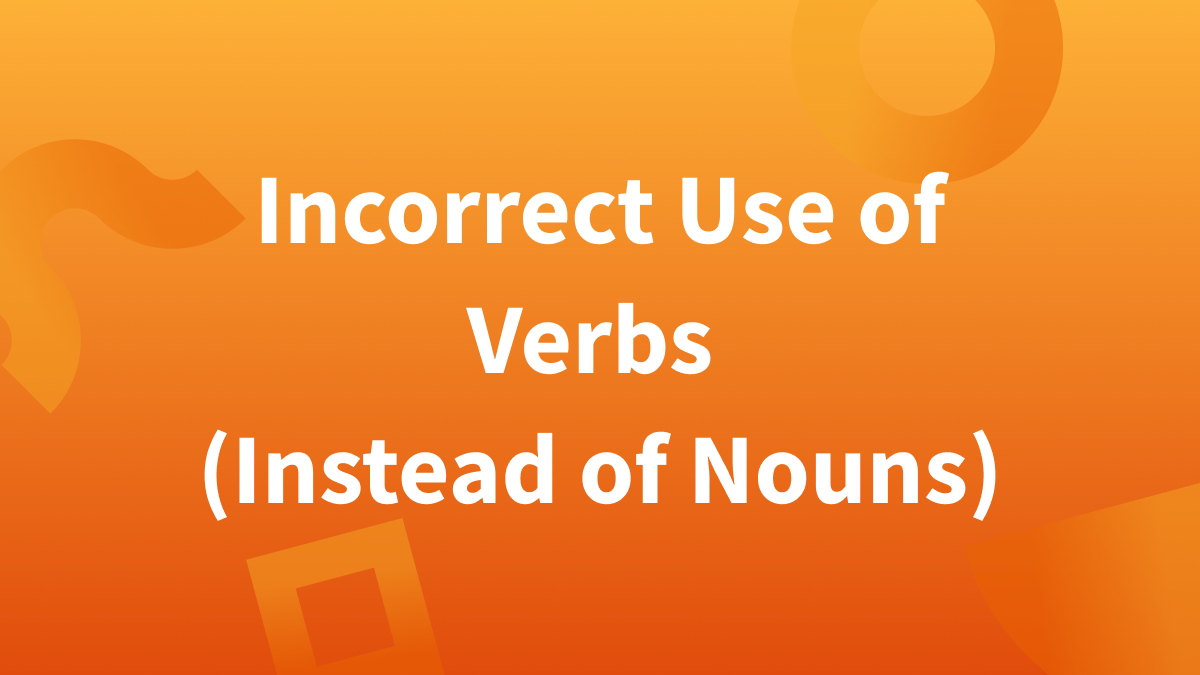Strategies to Detect Differences in Verbs and Nouns
How to Identify Nouns and Verbs
To be certain that the word after a determiner is definitely a noun, look out for modifications of the word in doubt. Due to morphological connections in the history of English, there are nearly no cases of isolated words. Therefore, every given expression has several relatives with other parts of speech. We show you three strategies that will help you to avoid misusing verbs, and select the correct nouns.
Strategy 1: Look for the Noun That Refers to the Verb
Be careful with using verbs instead of nouns. You can recognize verbs by identifying certain endings: -ize, -ify, -ate, or -en. Similarly, these verbs can also be transformed into nouns by merging them with the following suffixes:
| Typical ending | Verb | Noun |
|---|---|---|
| -ance / -ence |
perform differ |
performance difference |
| -ion | suffocate specify |
suffocation specification |
| -(e)ry | bake discover |
bakery discovery |
| -ment | enlighten advertise |
enlightenment advertisement |
| -al | propose try |
proposal trial |
-age | waste store |
wastage storage |
Instead of using the verb, always combine the noun with the determiner:
Incorrect
That was the extend of her jurisdiction.
Correct
That was the extent of her jurisdiction.
There are even more commonly used noun endings. Most of them indicate a conversion from adjective to noun, or from noun to another noun.
| Typical ending syllable(s) | Examples of nouns | Notes |
|---|---|---|
| -sis | diagnosis
analysis |
Especially used with verbs like analyze or diagnose |
| -ness | brightness friendliness |
Very common for adjectives (e.g., bright, friendly) |
| -ity | capability curiosity |
Very common for adjectives
(e.g., capable, curious) |
| -cy | urgency pregnancy |
Very common for adjectives
(e.g., urgent, pregnant) |
| -ship | friendship companionship |
Especially used with nouns
(e.g., friend, company) |
| -ism | racism socialism |
Societal ideologies |
| -er / -ent / -ant | server / servant student |
Labels for persons
(or objects) |
You can find many more of these morphological connections:
to believe—a belief, to prophesy—a prophecy, to describe—a description
It is even possible to retrieve several nouns from the same root.
The government differs in its terms of governance from the previous one.
Strategy 2: Be Aware of Exceptions and Use Them As Needed
There are some word pairs that have identical nouns and verbs. In these rare cases, you don’t have to worry about misusing a verb, since their written forms are the same. Occasionally, the verb reflects the noun directly.
You can drink a drink and fish some fish.
In other instances, the verb and the noun have only little to do with each other.
You park a car next to the city park.
Other cases indicate just a change in word stress:
to record (first syllable stressed) vs. the record (second syllable stressed) as in
He recorded the court proceedings, so now we have a record of them.
Fortunately, there are cases when you get to use a verb as a noun. Then, you need the gerund form of the verb, and you combine it with the definite determiner the.
The judges didn’t like the singing as much as the dancing.
Very few verbs have managed to exist as accepted nouns. We call these verbal nouns.
The mass killings were tragic wrongdoings.
Some verbal nouns have a meaning that’s different from the verb gerund itself. So, try to be aware of when to use the noun and when to use the stem verb in its gerund form.
Smoking is not allowed in this pub.
The group was smoking all the salmon they caught yesterday.
Strategy 3: Rephrase the Whole Sentence and Use a Verb Construction
The third strategy is to avoid a phrasing that requires a noun, and opt to use a verb instead. The result might be a gerund construction, or a subordinate clause.
After the arrival of your grandchildren, you won’t have time for cleaning the house.
→ After your grandchildren arriving, you won’t have time for cleaning the house.
→ After your grandchildren arrive, you won’t have time for cleaning the house.
Especially in long noun phrases, this technique can help to avoid confusion. In addition to precision and conciseness, sentences with more verbs usually appear more active and captivating for your readers.
Trick
Whenever you notice a high frequency of nouns in your writing, go back to strategy one and reverse it to change your nouns into proper verbs.
As you can see, you can easily lose your readers when you don’t pay attention to your written expression. Likewise to the rule not to use nouns as verbs, try to keep in mind the other way around. LanguageTool always supports your writing. You can rely on its spelling and grammar check, as well as its stylistic suggestions, no matter if you want to write an apply, a propose, an invite, or an inform.

